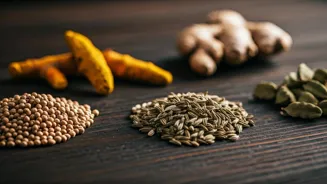Ginger's Magic
Ginger, a spice revered in Ayurveda, stands out for its ability to stoke the digestive fire, or Agni. This culinary wonder helps stimulate the production
of digestive enzymes, which aids in breaking down food more efficiently. Including ginger in your diet can alleviate bloating and gas, common symptoms of poor digestion. You can take it raw, in a smoothie, or brewed as tea, ginger is a versatile ally in the journey towards improved gut health. The warming properties of ginger also promote circulation, adding to its overall benefits. Moreover, ginger is a natural anti-inflammatory, supporting the gut's natural healing processes. Its pungent taste is a signal to the body to start the digestive process, making every meal easier on your stomach. Ginger can be added to various dishes, increasing their flavor and making it easier to digest.
Turmeric Power
Turmeric, known for its vibrant color and potent health benefits, is another cornerstone of Ayurvedic digestive remedies. Curcumin, the active compound in turmeric, offers remarkable anti-inflammatory properties. It helps to soothe the gut lining, reducing inflammation, which can disrupt digestion. Turmeric encourages the production of bile, which is critical for processing fats. This spice can ease digestive discomfort by protecting the gut from inflammation. To improve absorption, turmeric is often combined with black pepper, enhancing curcumin's bioavailability. Incorporating turmeric into your diet is a simple yet powerful way to support the digestive system. Use turmeric in curries, stews, or even in a warm, soothing drink.
Cumin's Contribution
Cumin is another spice that serves a crucial role in improving digestion. Cumin seeds have compounds that assist in the release of digestive enzymes, improving the breakdown of food. These seeds can reduce bloating and ease the digestive process. Their warm nature also supports the digestive fire, improving metabolism. In addition to its digestive benefits, cumin is also a good source of iron and other nutrients that contribute to overall health. Cumin is particularly good for supporting the absorption of nutrients from the food. It's great for balancing the body's doshas, making meals easier to digest. Cumin seeds are versatile and can be added to soups, stews, or even as a spice in your favorite dishes.
Ghee's Role
Ghee, or clarified butter, is a traditional Ayurvedic food that is beneficial for the Pitta and Vata doshas due to its ability to lubricate the digestive tract. Ghee helps to improve the absorption of fat-soluble vitamins, which supports digestive health. Its properties also aid in reducing inflammation, making it an excellent addition to any diet. Ghee provides nourishment and helps in soothing the digestive system. It also promotes the feeling of fullness, which makes the digestive process easier. Ghee's richness makes it a good ingredient for those who want to follow a healthy diet. Ghee is very versatile and can be included in many meals, adding flavor and aiding digestion.
Buttermilk Benefits
Buttermilk is a probiotic-rich drink that can help to balance gut flora. It also aids in relieving heartburn and indigestion. Buttermilk helps in the breakdown of complex foods, which makes it easier to digest. Its cooling effect is soothing for the gut lining, promoting digestion. Drinking buttermilk with meals is a traditional practice in India, offering a cooling and calming effect on the digestive system. It is a good source of calcium and other nutrients, contributing to overall health. Buttermilk can also help to absorb nutrients from foods. It is a refreshing and nutritious drink, making it a great choice for a healthier lifestyle.
Warm Oatmeal Advantage
Warm oatmeal offers a comforting and easily digestible meal that is gentle on the stomach. Its high fiber content aids in regular bowel movements, preventing constipation. Oatmeal absorbs excess stomach acids, providing relief from acidity and heartburn. Oatmeal's gentle nature makes it ideal for individuals experiencing digestive issues. Preparing oatmeal with warm water or milk enhances its digestibility. Oatmeal provides a balanced source of nutrients, keeping you full and energized, promoting overall health. Enjoying warm oatmeal can be a nourishing way to start your day, supporting the digestive system and promoting wellness.
Fennel Seed Support
Fennel seeds are widely used for their digestive properties. They relieve bloating, reduce gas, and promote healthy digestion. These seeds contain compounds that stimulate the production of digestive juices. Chewing fennel seeds after meals is a common practice to enhance digestion. Fennel seeds also offer a refreshing taste and aroma, making them a flavorful addition to meals. The seeds contain antioxidant and anti-inflammatory properties that aid in the process. Their gentle nature makes them suitable for those experiencing digestive discomfort. Fennel seeds can be consumed directly after meals or used in teas or dishes to aid digestion.
Cooked Apples/Pears
Cooked apples and pears are a great addition for those having digestive issues. The heat makes them easier to digest, especially for sensitive digestive systems. Apples and pears contain pectin, a soluble fiber that supports gut health and helps regulate bowel movements. They can soothe the digestive tract and ease discomfort. Cooking these fruits softens their texture, making it easier for the body to process them. The natural sugars in apples and pears offer energy without straining the digestive system. Cooked apples and pears are a beneficial and delicious way to support digestive health and promote comfort.











